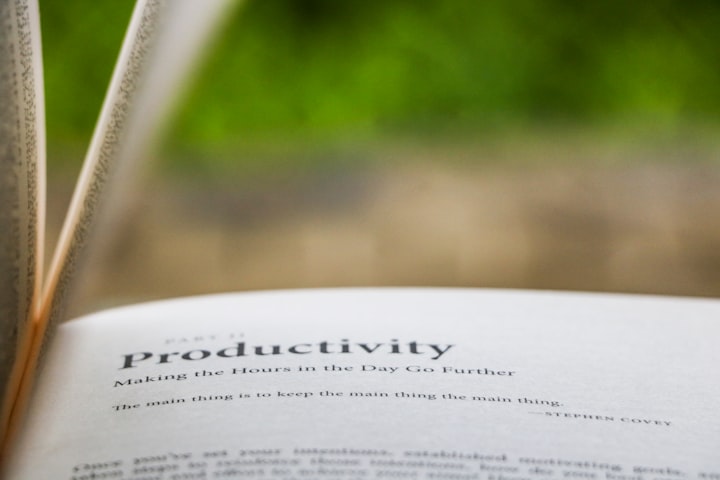How do motivation and self-control affect productivity?
motivation and self-control
Have you ever observed children? How they are agile, curious, and energetic until they are asked to do something? For example, to clean up their toys, wash their hands, or do anything else that is boring and uninteresting. Where do all the strength and energy go? It is as if they never existed, even though exactly a second ago we were observing a strictly opposite state of emotional and energetic rise.
Productivity - what is it?
Productivity is the ability to create in a certain period a certain amount of material product, an intellectual product, to produce a certain amount of physical and other actions, to achieve a certain result.
Productivity can be measured in quantifiable units, for example, if we are talking about physical labor and making a certain number of parts per shift, loading a certain number of tons of cargo, etc. In this sense, the term is often used synonymously with "productivity" or "labor productivity.
When it comes to the intellectual or creative sphere, we usually have to deal with value judgments like "high productivity" or "low productivity of work. The fact is that even if the creative or scientific process can be evaluated in quantifiable units (the number of written pages, painted pictures, developed scripts), it is possible to evaluate the genius of work only subjectively.
A screenplay of the same length can be an image of banality or claim to be genius. Paintings written in the same amount of time can be highly artistic, and can only hide under the definition of "I'm an artist, I see so. And even a business task (such as a presentation) completed by the deadline may blow up the audience and bring in new clients, or it may go unnoticed.
Thus, productivity is more about the outcome than the process. This fits well with the productivity formula:
Min effort + Max result = Max productivity
So we need to figure out how to achieve maximum results in the minimum amount of time, how to increase personal efficiency at work, in school, in creativity. By the way, this approach is still struggling to make its way. When scientists from Dartmouth College in the U.S. decided to study productivity, as a criterion of productivity was chosen duration of stay of the employee in the workplace, but not the result achieved by them.

In general, it remains to be seen what affects productivity. Of course, everyone has a different productivity style, but there are still general patterns.
What affects productivity?
Based on the formula derived above, productivity is the ability to achieve maximum results in minimum time. So, you need to determine what constitutes an outcome for you. For example, how many parts you have to make per shift on the machine, how much you have to sell in a working day, how many notebooks you have to check if you are a teacher at school, etc.
And here we come to a very important point. It is not enough to understand what you need the result. You need to understand why you need it. This is not a strange question, as it may seem at first. Yes, the plan of sales is sent down from above the heads, but only you can answer the question why you need to work as a sales manager.
Is your goal to buy a car? But maybe in some other way you can earn more? You have not been hired anywhere else? So maybe you should learn another specialty? Are you aiming for the position of sales manager? Then consider whether your excellent performance at work is enough to take this position in this company.
The situation is similar with any other area of employment. Yes, a math teacher has to check 60 notebooks with quizzes, but only he himself can know why he needs a job in school. Do you love children? Do you have enough interaction in the classroom to express your love for children? Maybe it would be more logical to organize a circle of young programmers?
Are you writing your dissertation on pedagogy? Are you sure that the material you collect will be relevant to the topic of your dissertation? Maybe it's time to apply for an assistant to the department at your local pediatrician? Or at least prepare a report for an industry conference and see the reaction of the scientific community? And there are many such nuances that affect productivity.
Thus, to become more effective, it is not enough to imagine the future result. It is necessary to have the motivation to achieve it. And it is worth talking about this in detail.
Why do we need motivation?
Motivation is a kind of driving force, a set of psychological and physical reactions that make us strive for something, want something, do and want to do. Motivation can be something tangible (money and what we can buy with it) or some idea (desire to make a scientific discovery, to become popular, to save the world).
Motivation can be positive and negative, and one action may indicate different types of motivating factors. For example, if a person goes to his job because he will not be taken anywhere else, or else he will have nothing to eat, this is a negative motivation, coming from a sense of fear, one way or another.
If a person works to become respected in his circles as a professional, to gain fame, to make a revolution in science, this is a positive motivation. If one only needs money for food and shelter, that is a negative motivation, based on fear of hunger and fear for one's safety. If one needs money for a round-the-world trip or one's own creative project, that is positive motivation. There are other gradations of motivation as well.
Types of motivation:
- Positive and negative.
- Intrinsic and extrinsic.
- Stable and unstable.
Stable motivation is the one that does not require additional reinforcement, i.e. the desire to avoid hunger, danger. As a rule, it is negative, i.e. it is based on destructive emotions such as fear. Unstable motivation requires additional reinforcement. For example, in order for a person not to lose enthusiasm for creative work, he or she needs, so to speak, applause and positive feedback from the audience or reader. One way or another, unstable motivation is more often positive.
About intrinsic and extrinsic motivation, it is worth clarifying that the same actions in different situations can be a consequence of different types of motivation. For example, going to college can be dictated by fear of getting into the army or pressure from parents, which is external motivation. Or it can be dictated by an interest in the future profession or a desire to go to study in the capital, which is an internal motivation.
How important is how to motivate yourself to achieve results and productivity? In general, positive intrinsic motivation is much more reliable than negative extrinsic motivation, because negative extrinsic motivation will end as soon as the stressor disappears. For example, the draft age will be over, or you can move out of your parents' house and live as you see fit.
Unsustainable motivation, strange as it may seem to some, is more reliable than sustainable motivation. In a world of modern opportunities, it is not so difficult to earn a piece of bread and sausage, a used car and a vacation in Antalya are also quite affordable. If basic needs are met and a person does not care about anything else, the motivation for further development disappears.
It's the same when the goal keeps in tone for many years and is not calculated only by the size of the salary, the hotel stars for the rest, and the age of the purchased car. It is especially good when you have like-minded people. As aptly noted by the author of the book "Willpower: How to Develop and Strengthen" Kelly McGonigal, "in the company of motivated people is easier to set goals and achieve them.
And as a model of positive motivation for results, we can consider the statement of Mark Zuckerberg, the founder of Facebook: "We do not create a quality product to make money out of it. We make money to create a quality product." But motivation alone won't be enough to be highly productive. You also need specific and regular actions to achieve results, and that requires self-control.
Why do we need self-control?
Self-control is the ability to control your emotions, thoughts, actions, and behavior. We began this article with the example of children. The main difference between adults is the ability to take control of their emotions, to banish negative thoughts, to do what needs to be done, even if it is not particularly desirable at the moment. How do you develop the ability to self-control?
This is where your motivation will help you. You want more money, right? It's time to do something that will help you earn it! Do you want applause from the audience? Then you need to rehearse regularly, and today, too. Controlling yourself and your business is easier if you segment your actions into simple understandable blocks.
If you need to earn money, set aside time to do your current job, find a new job, and/or learn a new profession. Searching or mastering can start small: for example, by looking at a daily list of jobs or reading educational literature on your future profession.
It's about the same with creativity. If you've decided that 3 rehearsals a week for 1 hour will get you closer to your goal, stick to that schedule. Then start to specify the content of each rehearsal: when you are working on new material, when you are perfecting and running through old material, what moments you are working on first.
These are elements of time management, which is a separate topic. You can read Gleb Arkhangelsky's book "Time-Drive. How to have time to live and work", which has survived many editions. It contains advice to "unglobalize" big things, or, as Arkhangelsky says, "to eat an elephant by cutting it into steaks.
There is advice on how to deal with the flow of small cases by presenting them like frogs. He calls it "eating a frog," but if you are very squeamish, you can replace it with "catching a frog." If you catch one frog a day, very soon you will catch them all, i.e. you will do the whole array of small things.

For convenience, Gleb Arkhangelsky (and not only him) advises to write things down, so as not to clog your memory and not to strain it by trying several times a day to remember what you haven't done yet. A plan in writing adds visibility to your tasks, relieves your brain for creative tasks in the long run, and makes you more productive.
Productivity can be increased if you don't just write things down, but also specify the desired outcome for which it is being done. Don't just "call the customer," but find out when they'll approve the layout. Not just "hold a meeting," but to give a specific person an assignment, to find out what stage of the task.
Also, Arkhangelsky emphatically advises to get rid of imposed goals and imposed motives that do not warm the soul and do not motivate you, do not stimulate your development. It is better to focus on what matters to you in life in general and in each specific area in particular. For example, work, studies, creativity, sports, family relations. This also, among other things, will help to increase productivity, because we, like children, are most active when we do what we like.
Many scientists come to this idea as well. So, there's the idea that self-control works best for people who... don't need self-control! They don't force themselves to learn because they enjoy learning. They don't force themselves to exercise because they enjoy working out and generally enjoy doing things that others require an effort of will.
How do you increase your productivity?
So, we've explored the basic components of productivity, and now we're ready to answer the question of how to become more productive.
How to become more efficient:
- Understand what results you strive for.
- Get rid of imposed goals and imposed motives.
- Understand what your motivation is and whether it is sufficient for your goals.
- Plan the actions necessary to achieve the result.
- Plan time for actions to achieve the outcome.
- Control yourself so you don't backtrack from the plan.
- If the motivation is gone, go back to step 1.
These are the basic steps to increase productivity. You can also use additional techniques to find time for all of the above. For example, Mark Zuckerberg prefers uniform clothing so as not to waste time on the selection of suitable closet elements, Bill Gates keeps 3 monitors insight with incoming mail, e-mail, which is now at work, and the Windows desktop screen, which allows you to quickly move to the right folder or program. Elon Musk is perfect at multitasking and doesn't waste even those couple of seconds while a document is being scanned.







Comments
There are no comments for this story
Be the first to respond and start the conversation.